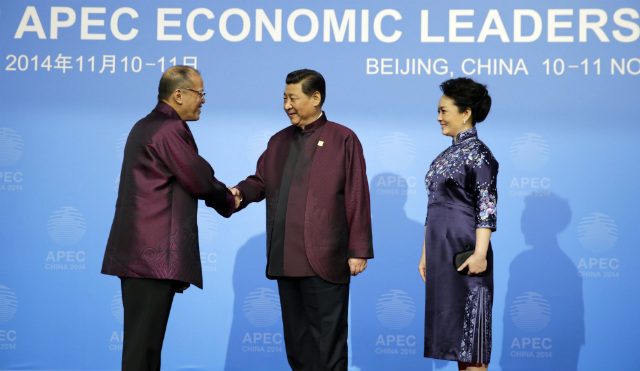SUMMARY
This is AI generated summarization, which may have errors. For context, always refer to the full article.

MANILA, Philippines – After the informal talks between President Benigno Aquino III and Chinese President Xi Jinping in November, will the two leaders again meet despite their countries’ heated row over the South China Sea (West Philippine Sea)?
Philippine Foreign Secretary Albert del Rosario did not rule out the scenario, saying Manila is seeking “constructive engagement” with China.
“I don’t see that as improbable,” Del Rosario said when asked about a possible second meeting between the two heads of state.
“As a matter of fact, I myself look forward to another meeting between the two leaders because I thought that the first meeting, though brief, was very constructive,” he said during a press briefing in Manila on Thursday, January 22.
Aquino and Xi met during the Asia-Pacific Economic Cooperation (APEC) summit in Beijing, an encounter the Philippine president described as a “nice opening.”
It was an informal meeting that lasted for 10 minutes after a tree-planting ceremony, and the first time the two met since the Philippines angered China by filing a historic arbitration case over the South China Sea.
Del Rosario said it was possible the two leaders will meet again as Manila plays host to APEC this year.
Yet the foreign secretary reiterated that Manila will pursue arbitration as it seeks to improve ties with the Asian superpower.
“In that [Beijing] conversation, it was the mutual desire of both presidents to improve bilateral relations between the two countries, and our position is we would like that very much,” Del Rosario said.
“We would, however, believe that this improvement in our bilateral relations does not, or will not, adversely affect our advocacies in terms of seeking clarification of our maritime claims through arbitration,” he added.
Sino-Philippine ties deteriorated since tensions rose in 2012 over competing claims in the South China Sea. Under Aquino, the Philippines legally challenged China’s claims before a Hague-based arbitral tribunal in early 2013, the first time a claimant country raised the dispute before an international legal body. (READ: What’s at stake in our case vs China?)
Vietnam, Malaysia, Brunei, and Taiwan also have claims to the South China Sea, an area strategic for supposedly holding vast deposits of oil and gas, rich fishing grounds, and major global shipping routes.
Bilateral talks still low-level
Del Rosario said that the Philippines is trying to “normalize relations” with China, again stressing that the maritime dispute is not “the sum total” of bilateral ties.
Still, Manila’s top diplomat admitted that, for now, talks are limited only up to the director level. Foreign Affairs Spokesman Charles Jose told Rappler this is equivalent to the assistant secretary level in the Philippine government.
“We haven’t resumed the vice ministerial [consultations] but at the levels of the DGs (directors-general), there are consultations. We hope these discussions are going to be constructive, hopefully elevated to higher levels in the bureaucracy,” Del Rosario said.
The secretary said that the goal is to separate the “contentious issues” on the maritime row from the major bilateral agenda involving other aspects, like economic ties.
Yet Chinese scholars have said that the arbitration case is a key obstacle to improving relations, and Beijing is only waiting for Aquino’s term to end in 2016. In turn, under Xi’s leadership, China grows increasingly aggressive in its maritime claims, and flexes its military, diplomatic, and economic muscles. (READ: PH to take up China reclamation before ASEAN)
The Philippines is moving forward with its arbitration case, preparing to submit written comments to the tribunal’s questions by March 15. Manila last year filed a 4,000-page pleading containing its legal arguments, evidence, and maps.
Instead of submitting its own pleading called a counter-memorial, China opted to issue a position paper as it continues to reject the arbitration process.
“[The written response] will be an expansion of what we had submitted, but we welcome actually the questions submitted to us. For example, it was good because we don’t have to guess what the questions will be. We can conclude from [China’s] paper what those questions would be that would be handed down to us,” Del Rosario said.
China has until June 16 to respond in writing. Manila is expecting oral arguments by July, and the issuance of a ruling after 6 months.
PH wants dialogue with Vietnam
Del Rosario also commented on Vietnam’s decision to indirectly join the arbitration case.
In a surprise move, Vietnam filed last December its position before the tribunal questioning China’s infamous 9-dash line, and recognizing the jurisdiction of the tribunal. Hanoi though reiterated its claim over the Paracel and Spratly Islands.
Del Rosario said, “The submission of Vietnam, as we see it, the positions taken there were in full accord with our submission and our position. Therefore, it would be very helpful to us, I believe.”
He said Manila is working to agree on a bilateral strategic dialogue with Vietnam, as it had done with the United States and Japan. This dialogue enhances countries’ cooperaton on a broad range of issues including maritime security.
“We are in discussion with Vietnam, and we are hoping these discussions will move forward,” Del Rosario said. – Rappler.com
Add a comment
How does this make you feel?
There are no comments yet. Add your comment to start the conversation.